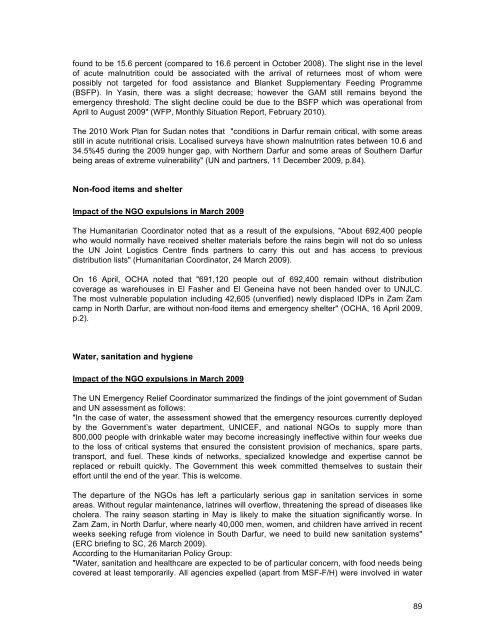SUDAN: Durable solutions elusive as southern IDPs return and ...
SUDAN: Durable solutions elusive as southern IDPs return and ...
SUDAN: Durable solutions elusive as southern IDPs return and ...
You also want an ePaper? Increase the reach of your titles
YUMPU automatically turns print PDFs into web optimized ePapers that Google loves.
found to be 15.6 percent (compared to 16.6 percent in October 2008). The slight rise in the level<br />
of acute malnutrition could be <strong>as</strong>sociated with the arrival of <strong>return</strong>ees most of whom were<br />
possibly not targeted for food <strong>as</strong>sistance <strong>and</strong> Blanket Supplementary Feeding Programme<br />
(BSFP). In Y<strong>as</strong>in, there w<strong>as</strong> a slight decre<strong>as</strong>e; however the GAM still remains beyond the<br />
emergency threshold. The slight decline could be due to the BSFP which w<strong>as</strong> operational from<br />
April to August 2009" (WFP, Monthly Situation Report, February 2010).<br />
The 2010 Work Plan for Sudan notes that "conditions in Darfur remain critical, with some are<strong>as</strong><br />
still in acute nutritional crisis. Localised surveys have shown malnutrition rates between 10.6 <strong>and</strong><br />
34.5%45 during the 2009 hunger gap, with Northern Darfur <strong>and</strong> some are<strong>as</strong> of Southern Darfur<br />
being are<strong>as</strong> of extreme vulnerability" (UN <strong>and</strong> partners, 11 December 2009, p.84).<br />
Non-food items <strong>and</strong> shelter<br />
Impact of the NGO expulsions in March 2009<br />
The Humanitarian Coordinator noted that <strong>as</strong> a result of the expulsions, "About 692,400 people<br />
who would normally have received shelter materials before the rains begin will not do so unless<br />
the UN Joint Logistics Centre finds partners to carry this out <strong>and</strong> h<strong>as</strong> access to previous<br />
distribution lists" (Humanitarian Coordinator, 24 March 2009).<br />
On 16 April, OCHA noted that "691,120 people out of 692,400 remain without distribution<br />
coverage <strong>as</strong> warehouses in El F<strong>as</strong>her <strong>and</strong> El Geneina have not been h<strong>and</strong>ed over to UNJLC.<br />
The most vulnerable population including 42,605 (unverified) newly displaced <strong>IDPs</strong> in Zam Zam<br />
camp in North Darfur, are without non-food items <strong>and</strong> emergency shelter" (OCHA, 16 April 2009,<br />
p.2).<br />
Water, sanitation <strong>and</strong> hygiene<br />
Impact of the NGO expulsions in March 2009<br />
The UN Emergency Relief Coordinator summarized the findings of the joint government of Sudan<br />
<strong>and</strong> UN <strong>as</strong>sessment <strong>as</strong> follows:<br />
"In the c<strong>as</strong>e of water, the <strong>as</strong>sessment showed that the emergency resources currently deployed<br />
by the Government’s water department, UNICEF, <strong>and</strong> national NGOs to supply more than<br />
800,000 people with drinkable water may become incre<strong>as</strong>ingly ineffective within four weeks due<br />
to the loss of critical systems that ensured the consistent provision of mechanics, spare parts,<br />
transport, <strong>and</strong> fuel. These kinds of networks, specialized knowledge <strong>and</strong> expertise cannot be<br />
replaced or rebuilt quickly. The Government this week committed themselves to sustain their<br />
effort until the end of the year. This is welcome.<br />
The departure of the NGOs h<strong>as</strong> left a particularly serious gap in sanitation services in some<br />
are<strong>as</strong>. Without regular maintenance, latrines will overflow, threatening the spread of dise<strong>as</strong>es like<br />
cholera. The rainy se<strong>as</strong>on starting in May is likely to make the situation significantly worse. In<br />
Zam Zam, in North Darfur, where nearly 40,000 men, women, <strong>and</strong> children have arrived in recent<br />
weeks seeking refuge from violence in South Darfur, we need to build new sanitation systems"<br />
(ERC briefing to SC, 26 March 2009).<br />
According to the Humanitarian Policy Group:<br />
"Water, sanitation <strong>and</strong> healthcare are expected to be of particular concern, with food needs being<br />
covered at le<strong>as</strong>t temporarily. All agencies expelled (apart from MSF-F/H) were involved in water<br />
89
















